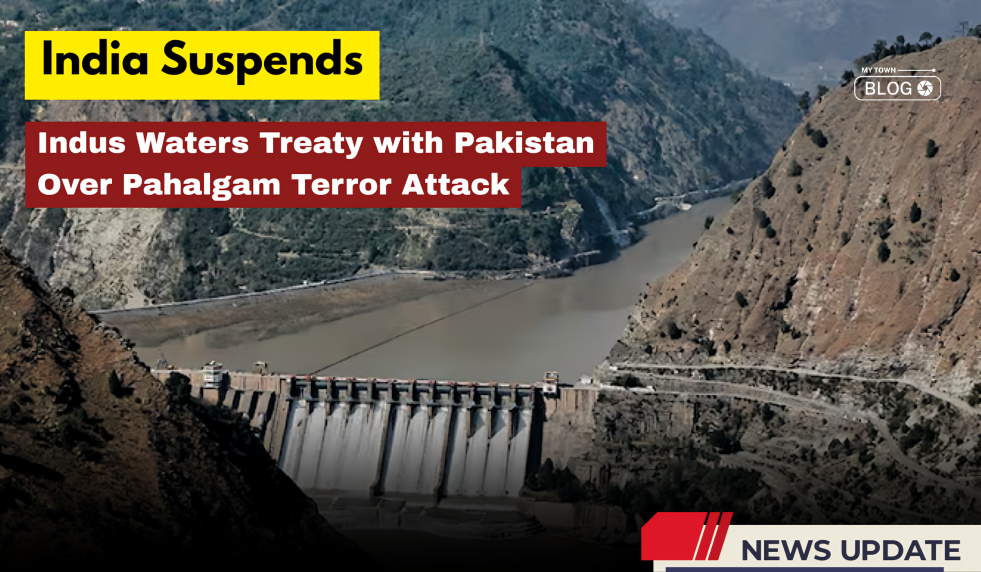In response to the brutal terror attack in Jammu and Kashmir’s Pahalgam, which claimed the lives of 26 civilians including tourists, India has taken a historic and unprecedented diplomatic stance against Pakistan. The measures, which include suspension of the Indus Waters Treaty, shutting down the Attari-Wagah Border, and expelling Pakistani military envoys, signal India’s zero-tolerance policy against cross-border terrorism.
The Pahalgam Terror Attack: What Happened?
On April 22, 2025, gunmen opened fire on a group of tourists in the picturesque valley of Pahalgam, Anantnag district. The targeted attack left 26 dead and scores injured. Eyewitnesses revealed that the assailants selectively identified and killed individuals after asking their religion, showcasing the premeditated nature of the massacre. Two foreign nationals were also among the deceased.
This horrific act has deeply shaken the nation and revived intense scrutiny over the role of Pakistan-based terror outfits allegedly involved in such cross-border operations.
Key Measures Announced by India
In a late-night press conference following a 2.5-hour-long Cabinet Committee on Security (CCS) meeting chaired by Prime Minister Narendra Modi, the Indian government unveiled a five-point strategy to address the threat. The following countermeasures were announced:
1. Suspension of the Indus Waters Treaty
India has indefinitely suspended the 1960 Indus Waters Treaty, which governs the flow of over 39 billion cubic meters of water from India to Pakistan annually. The treaty, considered a hallmark of peace amidst historical hostility, is now on hold until Pakistan credibly ends its support for terrorism.
2. Closure of Attari-Wagah Border Check Post
The Integrated Check Post (ICP) at Attari-Wagah, a lifeline for Indo-Pak trade and people-to-people engagement, has been closed with immediate effect. Individuals who crossed with valid documentation have been given a deadline of May 1, 2025, to return.
3. Expulsion of Military Envoys
India has declared the Defence, Naval, and Air Advisors at the Pakistani High Commission as persona non grata. They must leave the country within a week. In a reciprocal measure, India is also withdrawing its military envoys from Islamabad.
4. Restriction of SAARC Visa Exemption Scheme
All SAARC Visa Exemption Scheme visas issued to Pakistani nationals are deemed canceled. Those currently residing in India under the scheme have been ordered to exit within 48 hours.
5. Reduction of Diplomatic Staff
India has demanded that Pakistan reduce its diplomatic mission strength in New Delhi from 55 to 30 personnel, mirroring India’s downsizing in Islamabad.
Why the Indus Waters Treaty Matters
The Indus Waters Treaty, brokered by the World Bank in 1960, allocates control over six rivers between India and Pakistan. Despite three wars and countless skirmishes, the treaty remained untouched — until now. India’s decision to suspend it sends a clear signal: the era of “business as usual” in the face of terrorism is over.
This move could significantly impact Pakistan’s agriculture-based economy, which is heavily reliant on waters flowing from India.
Domestic Political Unity Amid Crisis
To consolidate national consensus, an all-party meeting was scheduled for Thursday evening. Senior leaders, including Home Minister Amit Shah, Defence Minister Rajnath Singh, and External Affairs Minister S. Jaishankar, are expected to brief opposition leaders. This move underscores the importance of bipartisan cooperation in national security matters.
Pakistan’s Response: Strategic Meeting on the Cards
Reacting swiftly, Pakistan has called for a National Security Committee (NSC) meeting chaired by Prime Minister Shehbaz Sharif. Defence Minister Khawaja Asif stated that decisions would be made to “appropriately respond to the Indian steps.” Diplomatic observers believe Pakistan may raise the issue at international forums including the United Nations and the Organisation of Islamic Cooperation (OIC).
Global Reactions and Implications
While official global reactions are still awaited, security analysts suggest that India’s firm response might garner support from nations equally affected by terrorism. The United States, France, and Australia have previously backed India’s right to self-defense. This latest episode could further isolate Pakistan diplomatically if credible links to the attackers are established.
Civil Society Reaction in India
The attack and India’s response have stirred intense emotions among citizens. Demonstrations were held across major cities, including a protest by the Save India Foundation at Jantar Mantar, New Delhi, where slogans against terrorism and Pakistan’s alleged complicity were raised.
The Road Ahead: Will This Change the Indo-Pak Equation?
India’s strategic move represents a shift in its Pakistan policy from restrained diplomacy to proactive deterrence. However, the real test lies in the coming weeks — whether Pakistan deescalates or retaliates diplomatically will shape the subcontinent’s near future.
Meanwhile, India has vowed to intensify surveillance across border areas and fully support the families of the victims. Security forces have also been tasked with tracking down the masterminds of the Pahalgam attack.
Conclusion
India’s suspension of the Indus Waters Treaty and closure of the Attari border mark a watershed moment in Indo-Pak relations. These decisions, catalyzed by the Pahalgam terror attack, represent a multi-layered diplomatic, strategic, and national security offensive. Whether this bold move leads to long-term peace or further escalation remains to be seen — but one thing is clear: India has drawn a red line, and it will not be crossed without consequence.
FAQ’s
What is the Indus Waters Treaty?
The Indus Waters Treaty is a water-sharing agreement signed in 1960 between India and Pakistan, allocating control over the Indus River system.
Why did India suspend the treaty now?
India suspended the treaty in response to Pakistan’s alleged support for the Pahalgam terror attack, viewing it as a necessary diplomatic measure.
What is the impact of shutting the Attari-Wagah border?
The closure halts trade and people-to-people contact, affecting economic activities and diplomatic ties between the two countries.
What’s next in India-Pakistan relations?
The situation remains fluid. It will depend on Pakistan’s response and whether global diplomatic pressure encourages de-escalation.
Also Read: Pahalgam Terror Attack: 26 Killed Including Navy Officer Days After Wedding








